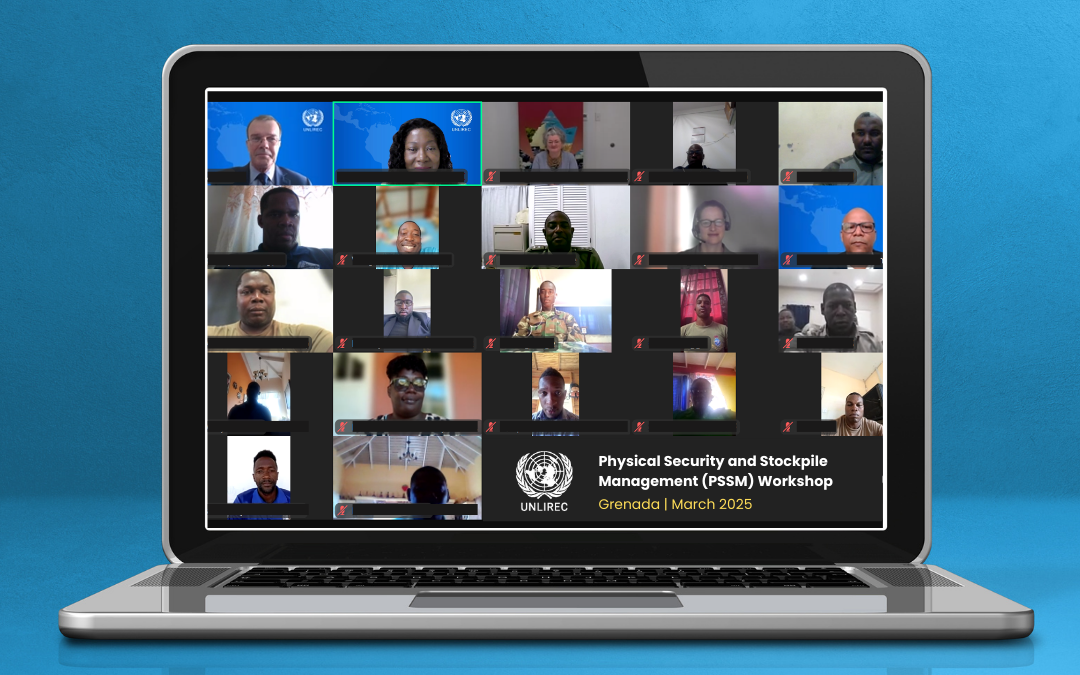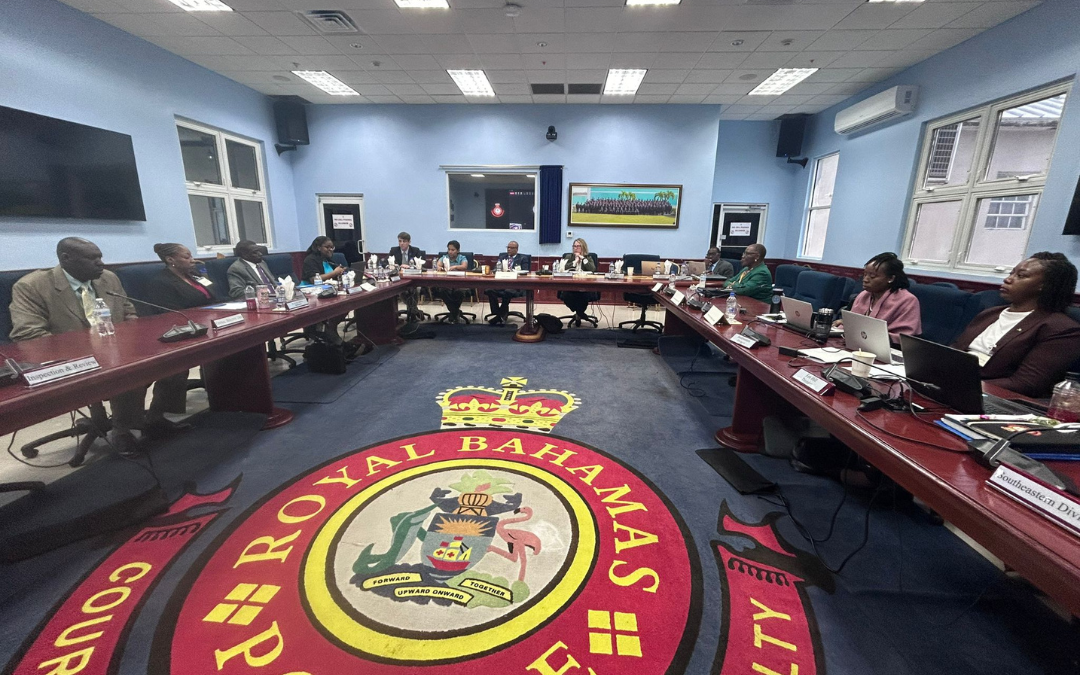
Mar 11, 2025 | Conventional Arms Programme
From 11 to 14 March 2025, 26 officials from the Royal Grenada Police Force and His Majesty’s Prison participated in the virtual Physical Security and Stockpile Management (PSSM) Workshop, organized by the United Nations Regional Centre for Peace, Disarmament and Development in Latin America and the Caribbean (UNLIREC).
Through presentations and practical exercises, participants were introduced to international standards and best practices in physical security and stockpile management, marking and recordkeeping, and firearms and ammunition destruction procedures. Effective stockpile management not only reduces the risk of loss, theft and accidents but also helps to identify obsolete or surplus weapons, contributing to overall peace and security.
The workshop aimed to enhance national capacities in managing and securing stockpiles of weapons, ammunition, and explosives in accordance with international norms and standards. The training combined theoretical lectures, practical exercises, and group discussions covering key aspects of PSSM.
The workshop is part of the technical assistance provided by UNLIREC under the project “Women, Youth And Disarmament and The Caribbean Firearms Roadmap”, funded by the Government of Canada. It supports national efforts to prevent the diversion of conventional weapons and ammunition and strengthen law enforcement capacities in securing stockpile facilities.
The workshop contributes to Goal 4 of the Caribbean Firearms Roadmap: “Systematically decrease the risk of diversion of firearms and ammunition from government- and non-government-owned arsenals”. By reinforcing stockpile security and safety, the initiative supports regional efforts to combat illicit firearms and ammunition trafficking and crime in the Caribbean.

Nov 14, 2024 | Conventional Arms Programme
From 13 to 14 November 2024, the Caribbean Community (CARICOM) and the Dominican Republic held the 4th Annual Meeting of States of the Caribbean Firearms Roadmap. This meeting, which was held virtually, brought together government officials, international partners and key stakeholders to assess progress in combatting illicit firearms trafficking in the Caribbean and to chart the way forward for enhancing regional cooperation. The meeting was organized by the United Nations Regional Centre for Peace, Disarmament and Development in Latin America and the Caribbean (UNLIREC), in partnership with the CARICOM Implementation Agency for Crime and Security (CARICOM IMPACS).
Izumi Nakamitsu, High Representative for Disarmament Affairs at the United Nations, delivered opening remarks in which she reflected on the successes of the Caribbean Firearms Roadmap and emphasized that it has become a critical regional framework for cooperation in arms control. “With sustained support from the international community, Roadmaps are proving to be effective, sustainable, and comprehensive mechanisms for enhancing arms control and ammunition management”, she said. She also commended the countries that have adopted National Action Plans as part of the operationalization of the Roadmap and encouraged others to finalize their plans as soon as possible.
In his remarks, Callixtus Joseph, Assistant Director for Policy, Strategy and Innovation (Ag.) from CARICOM IMPACS, underscored the importance of the Caribbean Firearms Roadmap as a key instrument in the region’s response to firearms trafficking. He emphasized the significance of the meeting by saying that “This meeting represents a critical opportunity to evaluate our progress, exchange ideas, and reaffirm our commitment to and strengthen our resolve against gun violence”.
The two-day meeting featured high-level discussions, technical exchanges and updates from national focal points and international partners.
The first day focused on providing an overview of the Roadmap’s implementation, with a ministerial-level dialogue, which offered participants the opportunity to reflect on the relevance of the Roadmap and its implementation in the context of national priorities and strategies. Through reflecting on the progress achieved by States to date, participants were able to identify areas where further support is still needed, chiefly among them being the development of monitoring and reporting capabilities. Meeting participants also shared concrete results of capacity building activities carried out thus far and underscored the importance of partnerships and regional cooperation in combating illicit firearms trafficking.
A key point stressed during the meeting was the continued importance of the support by donors and implementing partners in achieving the Roadmap’s objectives. The contributions of partners and co-custodians were showcased in a video produced by UNLIREC, wherein representatives from the various organizations shared insights from their work in the region in support of the Roadmap. The significant contributions of donor countries such as Canada, Germany, the United Kingdom, the United States, and the European Union were also highlighted as a clear demonstration of the international community’s commitment to assisting the region in its efforts to combat the illicit flow of firearms.
In the second day of the meeting, national focal points shared and discussed their experiences and progress over the past year, identifying challenges encountered in implementing the Roadmap’s actions, as well as the capacity-building needs that still need to be addressed. Looking ahead, participants outlined key priorities for the upcoming 2025 Midterm Review of the Roadmap.
Background
The Caribbean Firearms Roadmap is a regional umbrella framework adopted by CARICOM States and the Dominican Republic in 2020, in which States commit themselves to implement concrete actions against illicit firearms trafficking and make the Caribbean a safer region. To date, 16 countries in the region have formally adopted the Roadmap, and many have developed National Action Plans to tailor the framework to their unique national contexts. The Roadmap signifies a commitment by States of the region to implement sustainable solutions to prevent and combat armed violence and crimes that are aligned with international norms and the broader goal of promoting sustainable peace, security and development across the Caribbean.
About UNLIREC
The United Nations Regional Centre for Peace, Disarmament and Development in Latin America and the Caribbean (UNLIREC) is one of three regional centres under the United Nations Office for Disarmament Affairs. Since its establishment in 1986, UNLIREC has worked to promote peace, security and disarmament throughout the region.
For more information, please contact secretary@unlirec.org.

Sep 23, 2024 | Conventional Arms Programme
From 23 to September 25, 2024, the Government of The Bahamas, supported by the United Nations Regional Centre for Peace, Disarmament, and Development in Latin America and the Caribbean (UNLIREC) and the Caribbean Community’s Implementation Agency for Crime and Security (CARICOM IMPACS), held a three-day inter-institutional roundtable meeting in Nassau to advance on the development of their National Action Plan as part of the Caribbean Firearms Roadmap initiative.
UNLIREC and CARICOM IMPACS are the co-custodians of the Roadmap. They are supporting its effective implementation in collaboration with other regional and international partners with the support of the donor community. This meeting marks a key milestone for The Bahamas by aligning its national priorities with the overarching vision of the Caribbean Firearms Roadmap to create a safer region. By developing a National Action Plan, The Bahamas joins twelve other Caribbean nations in identifying priority actions and tracking progress in combating illicit firearms trafficking.
The event brought together 22 Bahamian officials, including nine women, from agencies such as law enforcement, prosecution, justice, defense, customs, immigration, and foreign affairs. Discussions focused on monitoring, evaluation, and national firearms-related challenges, with participants adopting a comprehensive approach to addressing illicit firearms trafficking and fostering a collaborative framework for future progress.
Presentations and discussions covered the legal framework for Goal 1 and best practices for Goals 2, 3, and 4. As a result, The Bahamas outlined national priorities and concrete actions they wish to take forward in their National Action Plan and completed a significant portion of its baseline assessment.
The vision for the Roadmap is a safer Caribbean. This will be achieved by adopting sustainable solutions to the prevention and combat of illicit proliferation of firearms and ammunition that are consistent with international norms and the Caribbean context. The meeting was aligned with the UN Programme of Action on Small Arms and the 2030 Agenda for Sustainable Development, particular Goal 16, and was financially supported by the United States Government.
For more information on the Caribbean Firearm Roadmap visit: https://unlirec.org/en/publicacion/caribbean-firearms-roadmap/

Aug 29, 2024 | Conventional Arms Programme
On 23 July, 25 July, and 14 August 2024, the United Nations Regional Centre for Peace, Disarmament and Development in Latin America and the Caribbean (UNLIREC), in collaboration with the Caribbean Community Implementation Agency for Crime and Security (CARICOM IMPACS) delivered a series of webinars centred on the monitoring and evaluation (M&E) component of the Caribbean Firearms Roadmap (CFRM).
The three webinars were conducted as part of a broader initiative to support States in their monitoring and evaluation efforts, titled “Roadmap to Reporting: A Sensitization and Training Series for Monitoring and Evaluation under the Caribbean Firearms Roadmap” ahead of the reporting deadline of 25 September 2024.
The webinars addressed three key topics, beginning with an introduction to M&E for the CFRM, followed by the data collection for the CFRM, and the use of data to advance the CFRM.
Presentations were delivered by UNLIREC, CARICOM IMPACS, and the United Nations Development Programme, Southern Eastern and Eastern Europe Clearinghouse for the Control of Small Arms and Light Weapons (UNDP SEESAC). Additionally, States were invited to share their experiences with the M&E processes of the Caribbean Firearms Roadmap during these sessions.
A total of fifty-nine persons participated in at least one of the webinars, including twenty-two women, representing nine States: Bahamas, Barbados, Belize, Dominican Republic, Haiti, Guyana, Jamaica, Saint Lucia, and Trinidad and Tobago.
The series of webinars was carried out in line with Goal 1 of the Caribbean Firearms Roadmap, in particular, Action 1.3.3, as well as Sustainable Development Goal 16, “Peace, justice, and strong institutions” (Target 16.4), and were made possible with funding from Canada.
UNLIREC, as the regional centre for the United Nations Office for Disarmament Affairs seeks to advance the cause of practical disarmament in Latin America and the Caribbean. This effort is part of its commitment to support Member States in implementing international disarmament and non-proliferation instruments, in particular the 2001 United Nations Programme of Action on Small Arms (UN PoA).

Apr 16, 2024 | Conventional Arms Programme
On 16 April 2024, the United Nations Regional Centre for Peace, Disarmament and Development in Latin America and the Caribbean (UNLIREC), in collaboration with the Caribbean Community Implementation Agency for Crime and Security (CARICOM IMPACS), hosted the year’s first Partner Coordination meeting for the Caribbean Firearms Roadmap (CFRM).
This virtual meeting provided Implementing Partners with the opportunity to discuss progress made in the implementation of the Roadmap, and future support to be provided to States. This was done with the aim of furthering partner collaboration and coordination of activities.
During the session, topics discussed included: the status of National Action Plans and Monitoring and Evaluation processes; Outcomes of the 3rd Annual Meeting of States for the CFRM, held in Saint Lucia in November 2023; and the tools being used by partners to coordinate efforts. As part of the meeting, partners also discussed activities and support to be offered to States in 2024.
Sixteen persons participated in the event, including ten women. A wide range of partner organizations were present, including the International Criminal Police Organization (INTERPOL), Mines Advisory Group (MAG), Organization of American States (OAS), Small Arms Survey (SAS), United Nations Office on Drugs and Crime (UNODC), and World Customs Organization (WCO).
The Partner Coordination meeting was conducted in line with Goal 1 of the CFRM, to reinforce regulatory frameworks governing firearms and ammunition, particularly Target 1.3.3, as well as Sustainable Development Goal 16: Peace, justice and strong institutions, with particular relevance to Target 16.4. The meeting was made possible to generous funding from the government of Germany.
UNLIREC, as the regional centre for the UN Office for Disarmament Affairs, seeks to advance the cause of practical disarmament in Latin America and the Caribbean as part of its commitment to support Member States in their implementation of international disarmament and non-proliferation instruments, in particular, the 2001 UN Programme of Action on Small Arms (UN PoA).





